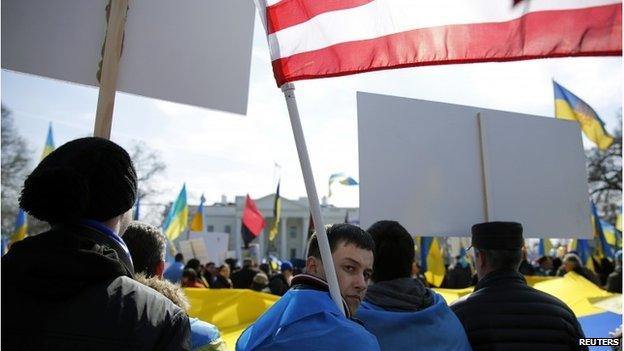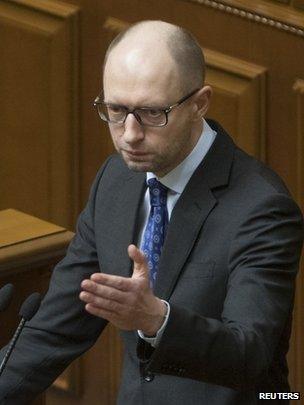Ukraine crisis: Critical moment for US power
- Published

Ukraine's acting Prime Minister, Arseniy Yatsenyuk, will go into the White House today, apparently a question for President Obama ready on his lips.
It boils down to: "How far will you go, to help us?"
Before he left home for Washington he spoke to Ukraine's parliament.
"A country which willingly gave up its nuclear arsenal... and received guarantees from the world's leading countries, finds itself unprotected, one-on-one with a country which is armed to its teeth," he said.
"If you do not uphold these guarantees… then explain how you will convince Iran and North Korea to give up their nuclear status."
It is a good question.

Ukraine's Arseniy Yatsenyuk visits Washington on Wednesday
President Barack Obama will talk tough. He is co-ordinating a Western response. A new statement, external from the G7 nations sounds pretty hardline.
It warns that if Sunday's referendum in Crimea goes ahead it would have no moral or legal effect, and would violate the UN charter and four other international agreements.
It says "the annexation of Crimea could have grave implications for the legal order that protects the unity and sovereignty of all states." But there is little really new in the G7 statement, however necessary it is to feed into the new cycle ahead of the Ukrainian PM's visit.
There are strong suggestions of more action.
The European Union has finally agreed, external the outline of new sanctions, and the US has made it clear it will impose penalties if the referendum goes ahead.
But what then?
It is possible that, before the weekend, Russia will choose to find a way of easing the crisis - what everyone here is calling "the off-ramp, external". But it is more likely Russian President Vladimir Putin doesn't think he's driving an out-of-control car that needs such an escape route, and is quite happy with the speed and direction he's going. He can spot the sanctions ahead and maybe smash through the barriers and continue on his way.
Then the US, and the EU would be in a bit of a spot. Maybe it is obvious, but it is worth stressing, that despite the movement of Nato hardware, external on Europe's borders, no-one sensible is talking about military action. Indeed, it is striking that not even stupid people are talking about military action.
As far as I can see, no-one in the West thinks Ukraine is worth a war with another nuclear power. Even those who remain enthusiastic about bombing Syria, who demanded, and got, action in Libya, who still justify the invasion of Iraq, are decidedly silent.
Some think this moment has only arrived as a result of Obama's foreign policy. That is a matter for debate, but seems an unfair criticism of his options now.
This is a critical moment, external for US power - and its limits.